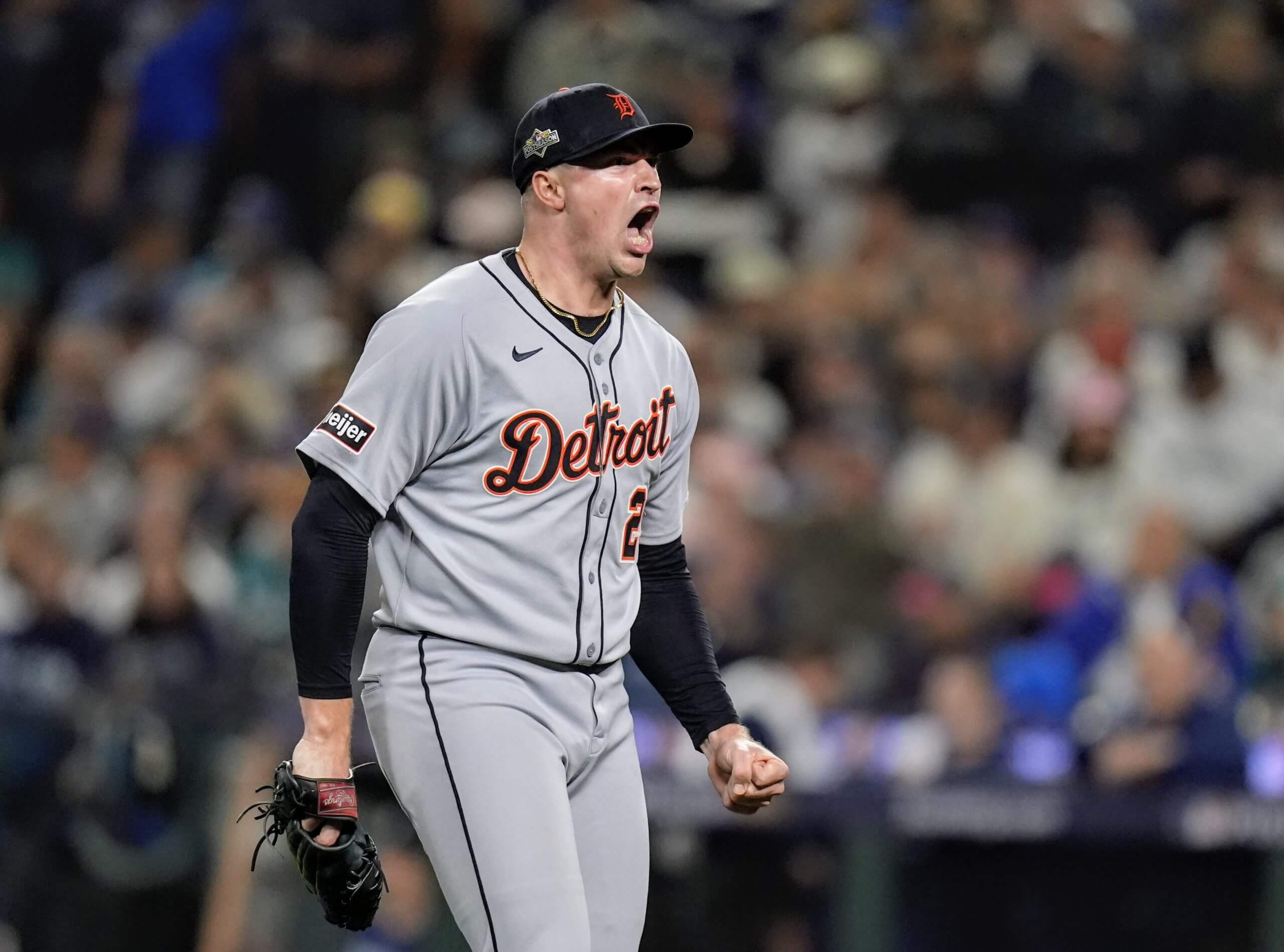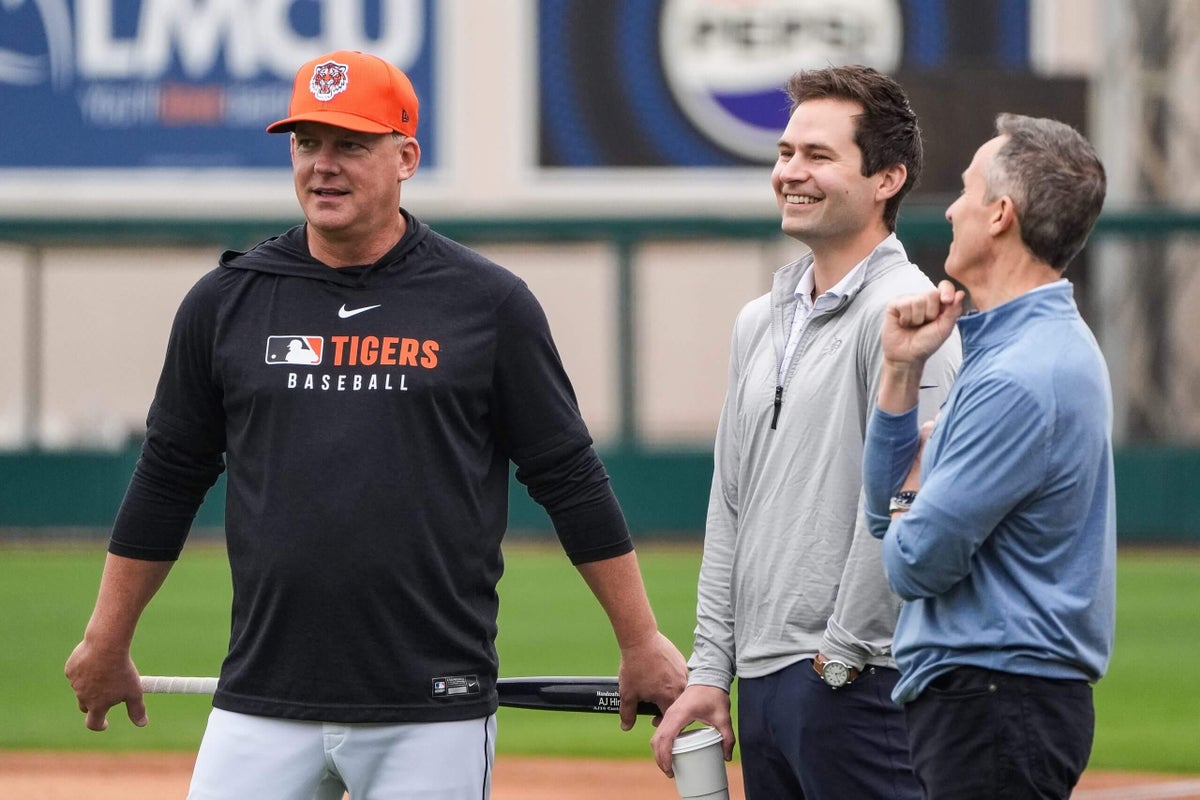SEATTLE — The Detroit Tigers lost an arduous 15-inning heartbreaker to the Seattle Mariners in Game 5 of the American League Divisional Series on Friday. Now the team faces what could be an even longer and harder winter.
The Tigers were the first team in the major leagues this season to reach 30, 40, 50 and 60 wins. They had the American League’s best record on Aug. 1. They have one of the best farm systems in baseball and much to feel good about.
But they finished with only 87 victories, fumbling away an American League Central lead that peaked at 14 games, going 7-17 in September to mark the biggest collapse in MLB’s divisional era. By the end, the team’s pitching was broken down. They had only three true starters. The front and middle of their bullpen was filled with question marks and tryouts. Members of the team’s young hitting core hit frustrating road blocks, and what was supposed to be a special season ended with a stranger, more uncertain vibe.
Now president of baseball operations Scott Harris and the rest of the team’s brass are charged with building a more robust major-league roster, all as they remain set on building a sustainable winner.
Winter is coming. Here are a few key points to consider.
What will the Tigers do about Tarik Skubal?
Next season will be Skubal’s last under team control. He is a free agent after 2026. Skubal is likely to win a second straight Cy Young Award and is this team’s greatest asset. Harris, though, has famously talked about not believing in this period of time as a Skubal Window. He wants an organization capable of contending year in or year out, regardless of whether the Tigers have the best left-handed pitcher on the planet.
That approach leads us to some hard questions. Namely, is there any way the Tigers would consider trading Skubal this winter? If they really don’t believe in windows, perhaps they could try to capitalize on getting considerable talent in exchange for Skubal, the way the Brewers once did with Corbin Burnes or even like the Astros did this past offseason with Kyle Tucker. It would not be a popular move. But there’s a real argument it would be the best way add talent to the organization for the long-term.

Skubal has demonstrated his immense value in the postseason, as his 56 strikeouts in his first six career playoff outings are second only to Hall of Famer Bob Gibson, who had 57. (Junfu Han/USA TODAY NETWORK via Imagn Images)
The Tigers could certainly try to negotiate an extension with Skubal, but as a Scott Boras client with the potential to set the market for starting pitchers with a record deal, the chances of Skubal not at least testing free agency seem slim.
Asked about the possibility of signing Skubal after the Tigers celebrated winning the AL Wild Card Series, Tigers CEO and chairman Chris Ilitch said only: “We’re in 2025 right now. We’re just going to focus on the playoffs and really just focus on the game in front of us.”
Skubal was asked about the team’s direction and his future in Detroit after Friday’s Game 5 loss.
“That’s not my job, to do anything other than play,” he said. “Those questions should be asked toward the front office and the people that make those decisions, but my job is to go out there and play.”
So if 2026 is likely to be Skubal’s final season in Detroit, should there be a more aggressive push to put a better roster around him?
That, it seems, would be admitting the existence of a Skubal Window.
Filling the infield, fixing the offense
Gleyber Torres will be a free agent after posting a 113 wRC+ in his one year with the Tigers. That means there is an opening at second base. The Tigers could fill that in a variety of ways. They could move Colt Keith — who started this season at first, then played first and second, then finished it playing third — back to the keystone. They could hand the second base job to prized prospect Kevin McGonigle, who should debut next season but also has yet to play above Double A. They could also consider McGonigle at shortstop, where the Tigers have the likes of Javier Báez, Zach McKinstry and Trey Sweeney. Opinions from evaluators on McGonigle’s ability to handle shortstop on an everyday basis are varied. He could just as likely play third.
In free agency, there’s a chance Alex Bregman opts out of his deal with the Red Sox. Would the Tigers pursue him the way they did this past winter, given the fact Bregman is a year older and would still be looking for a long-term deal? Bo Bichette is another option, but his defensive numbers at shortstop have cratered, and he might be better suited moving to third. The Tigers could keep an eye on Ha-Seong Kim, who could opt out of his deal with the Braves.
Regardless of the path the team chooses, it seems time to get serious about adding a proven, veteran player on a multiyear deal.
And whether they spend big or not, they will be looking to fill a void in the infield while also somehow replacing Torres’ right-handed production.
Also keep in mind the Tigers had MLB’s fourth-highest strikeout rate and drew walks at only an average clip. One way or another, that has to change in 2026.
Rebooting the pitching factory
One year ago, it seemed the Tigers were knocking on the door of becoming baseball’s next pitching factory. This season, though, the Tigers’ staff ranked 17th with a 3.97 ERA. Detroit was only one game above .500 in games started by pitchers not named Skubal.
Worse, the organization’s evaluation and development seemed to take a step backward. Jack Flaherty did not have the same success he did in 2024. Flaherty has a $20 million player option for next season and could make more by opting out and accepting the qualifying offer, which presents an interesting dilemma. John Brebbia was a bust in free agency. Tommy Kahnle had a strong start to the season but finished with a 4.43 ERA. We all know what happened with Charlie Morton and Chris Paddack at the trade deadline.
Despite having a bundle of interesting arms in spring training, Troy Melton was the lone standout who improved and made a real difference on the major-league club. Melton could join Skubal, Casey Mize, Reese Olson and perhaps Flaherty in the rotation next season.
But many of the Tigers’ other additions from minor-league deals or waiver claims did not emerge in the way the team hoped. There are pitchers such as Dylan Smith and Drew Sommers who could be helpful relief options with another year of experience. But only one of Detroit’s top-10 prospects, per MLB Pipeline, is a pitcher. That’s Jaden Hamm, who had a 4.70 ERA and took a significant step backward in the minor leagues this year. Jackson Jobe, meanwhile, is likely to miss all of next season rehabbing from Tommy John surgery.
The Tigers will have to consider spending more on pitchers — or parting with hitting prospects in trades — while also bolstering the pitching elsewhere in their system.
Many parts of this organization remain headed in a positive direction. But going from good to great is the hardest part. If the end of the 2025 season is any indication, the Tigers have a lot of work ahead.
(Top photo: Junfu Han/USA Today Network)

